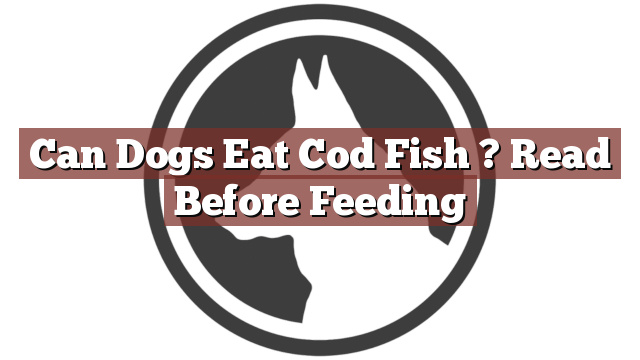Understanding Your Dog’s Dietary Needs
As a dog owner, it is important to be mindful of what you feed your furry friend. Dogs have specific dietary needs that differ from humans, and it is crucial to provide them with a balanced and nutritious diet. While dogs are primarily carnivorous animals, some fruits, vegetables, and even certain types of fish can be included in their diet. However, it is essential to research and understand which foods are safe and beneficial for your canine companion.
Can Dogs Eat Cod Fish? Read Before Feeding
Can dogs eat cod fish? This is a common question among dog owners, especially those who enjoy sharing their meals with their pets. The answer is yes, dogs can safely consume cod fish. In fact, cod fish is often found as an ingredient in many commercial dog foods due to its nutritional value. Cod fish is a great source of lean protein, which is essential for muscle development and overall health in dogs.
Pros and Cons of Feeding Cod Fish to Dogs
Feeding cod fish to your dog comes with several benefits. As mentioned earlier, cod fish is a rich source of lean protein, which aids in building and repairing tissues. It also contains omega-3 fatty acids, which promote a healthy coat and skin, reduce inflammation, and support brain function. Additionally, cod fish is low in calories and fat, making it an ideal choice for dogs on a weight management program.
However, it is important to exercise caution when introducing any new food into your dog’s diet. Some dogs may be allergic to fish, including cod fish. Watch out for signs of an allergic reaction such as itching, swelling, vomiting, or diarrhea. Also, be sure to remove all bones from the cod fish before feeding it to your dog, as they can pose a choking hazard or cause internal injuries if ingested.
In Conclusion: Considerations for Feeding Cod Fish to Your Dog
While it is safe for dogs to eat cod fish, it is important to do so in moderation and as part of a balanced diet. Cod fish should not be the sole source of nutrition for your dog, as they require a variety of nutrients from different food sources. Always consult with your veterinarian before making any significant changes to your dog’s diet, especially if your dog has any pre-existing health conditions or dietary restrictions.
In summary, cod fish can be a healthy addition to your dog’s diet, providing valuable nutrients and omega-3 fatty acids. However, it is crucial to be aware of any potential allergies or sensitivities your dog may have and to remove all bones from the fish before feeding it to your furry friend. By understanding your dog’s dietary needs and making informed choices, you can ensure their overall health and well-being.
Thank you for taking the time to read through our exploration of [page_title]. As every dog lover knows, our furry friends have unique dietary needs and responses, often varying from one canine to another. This is why it's paramount to approach any changes in their diet with caution and knowledge.
Before introducing any new treats or making alterations to your dog's diet based on our insights, it's crucial to consult with a veterinarian about [page_title]. Their expertise ensures that the choices you make are well-suited to your particular pet's health and well-being.
Even seemingly harmless foods can sometimes lead to allergic reactions or digestive issues, which is why monitoring your dog after introducing any new food item is essential.
The content provided here on [page_title] is crafted with care, thorough research, and a genuine love for dogs. Nevertheless, it serves as a general guideline and should not be considered a substitute for professional veterinary advice.
Always prioritize the expert insights of your veterinarian, and remember that the health and happiness of your furry companion come first.
May your journey with your pet continue to be filled with joy, love, and safe culinary adventures. Happy reading, and even happier snacking for your canine friend!

